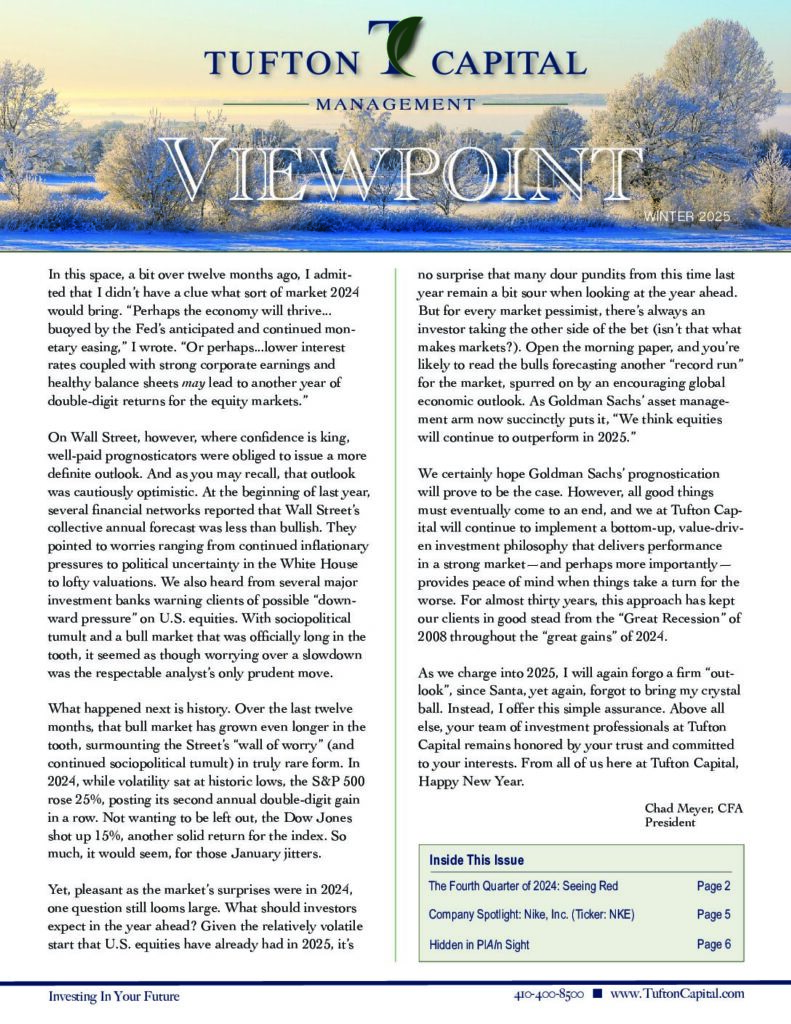 It was another disappointing quarter for the financial markets as investors remained cautious in the face of high energy prices and continued weakness in the housing market. Uncertainty regarding the Federal Reserve’s course of action in dealing with the economic weakness and credit market issues has also constrained investors. For the quarter, the Dow Jones Industrial Average was off 6.9% following a decline of 6.8% in the first quarter, bringing the year-to-date decline to 13.3%. The month of June was the worst June since 1930, as the Dow was off 10.0%. The S&P 500 was down 11.9% in the first-half. Other indices reported similar first-half results, with the NASDAQ down 13.5% and the Russell 2000, an index of small capitalization companies, off 10.0%. Stock prices tumbled in the quarter due to an especially poor performance by the financial sector. Although J.P. Morgan Chase successfully completed its merger with the failing Bear Stearns, continued problems remain in the sector. The rescue of Bear Stearns was necessary because its business model was not adequately diversified, as it was dependent primarily on sub-prime mortgages and newer “experimental” derivative products, such as credit default instruments.
It was another disappointing quarter for the financial markets as investors remained cautious in the face of high energy prices and continued weakness in the housing market. Uncertainty regarding the Federal Reserve’s course of action in dealing with the economic weakness and credit market issues has also constrained investors. For the quarter, the Dow Jones Industrial Average was off 6.9% following a decline of 6.8% in the first quarter, bringing the year-to-date decline to 13.3%. The month of June was the worst June since 1930, as the Dow was off 10.0%. The S&P 500 was down 11.9% in the first-half. Other indices reported similar first-half results, with the NASDAQ down 13.5% and the Russell 2000, an index of small capitalization companies, off 10.0%. Stock prices tumbled in the quarter due to an especially poor performance by the financial sector. Although J.P. Morgan Chase successfully completed its merger with the failing Bear Stearns, continued problems remain in the sector. The rescue of Bear Stearns was necessary because its business model was not adequately diversified, as it was dependent primarily on sub-prime mortgages and newer “experimental” derivative products, such as credit default instruments.
It was not much better in the bond market as yields across the U.S. Treasury curve moved higher by about a half percent, driving bond prices down during the quarter. For the year, though, yields are essentially unchanged. The yield on the 10-year Treasury, for example, was 3.94% at the end of the period versus 4.15 % on December 31st. (more…)
 About the best that can be said for the first quarter of 2008 is that it is over. The economy weakened in the quarter as continued worsening conditions in the housing market spread to the broader consumer sector. By quarter’s end, there were new signs of troubles in the capital spending sector of the economy. All of the developments were further burdened by extremely high oil prices, which briefly exceeded $110 a barrel in the quarter. The stubborn and surprising unity of the OPEC oil cartel is now having a negative impact on the developed, developing and, especially, the third world countries.
About the best that can be said for the first quarter of 2008 is that it is over. The economy weakened in the quarter as continued worsening conditions in the housing market spread to the broader consumer sector. By quarter’s end, there were new signs of troubles in the capital spending sector of the economy. All of the developments were further burdened by extremely high oil prices, which briefly exceeded $110 a barrel in the quarter. The stubborn and surprising unity of the OPEC oil cartel is now having a negative impact on the developed, developing and, especially, the third world countries.
Economic jitters spread through the financial markets in the first quarter, fueled by concerns that some of the newer synthetic financial securities, engineered by Wall Street, were coming unhinged. The loss of confidence reflected in the absence of liquidity in many of these exotic securities caused dislocations in the markets. Although most of the securities were held by large financial institutions all over the world, many were held by “sophisticated” hedge funds and other investment novelty organizations. Indeed, some notable hedge funds failed because of it, including one run by the once well-regarded Carlyle Group. (more…)



